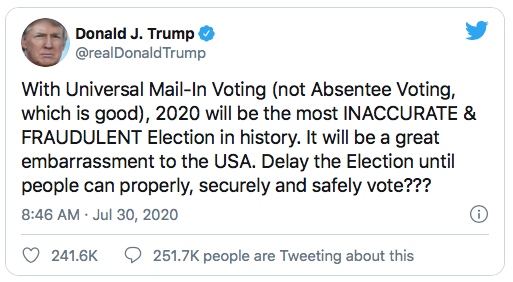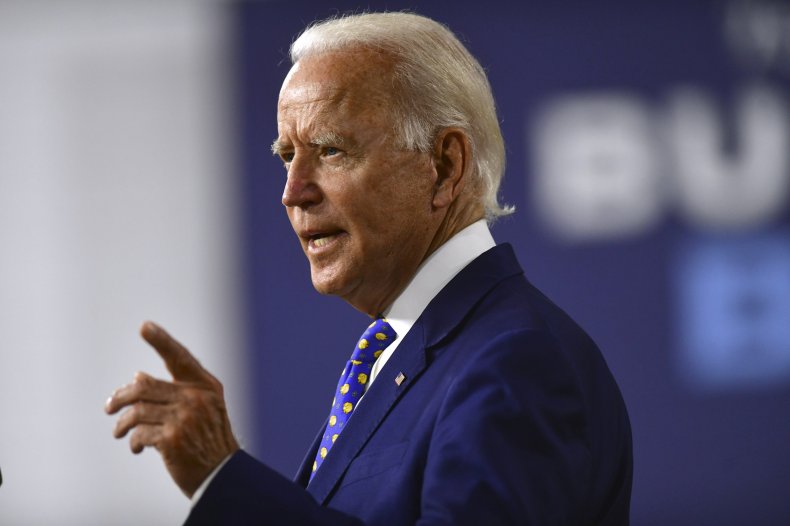On Thursday, the nation learned that second-quarter U.S. gross domestic product was down by a third, the biggest one-quarter drop on record. It’s an astounding measure of just how deeply the coronavirus lockdowns imposed by the governors, combined with their reluctance to reopen their states for business, has affected life in America.
If these were normal times, the story would lead everywhere. The news channels would have economists on all day talking about what it means, not just for President Donald J. Trump’s re-election prospects, but for the health of the dollar and the status of the recovery. Faced with numbers like that, the national conversation should be about whether America will ever regain its leadership role in the global economy. Instead, everyone is talking about whether the November 3 election can, or should, be postponed.
Welcome to Trumpworld, where the president of the United States lives rent-free inside the heads of nearly every talk show host, newspaper editor, political reporter, pundit and Democratic officeholder. They’re obsessed with him and he, over his almost four years in office, has become expert at pushing their buttons—as he did with this Thursday morning tweet:

Almost immediately, and it’s hard to believe the president didn’t intend for this to happen, the airwaves and the Internet were full of conversations and prognostications about the election being put off, usually with the spin attached that Trump, by proposing it, was only putting off his inevitable defeat. What this kind of commentary misses is that he still hasn’t lost his ability to turn the conversation in any direction he wants, at any given time. Once the campaign starts in earnest, which will probably happen as soon as Joe Biden is locked in as the Democratic nominee, things will get really ugly, really fast.
Right now, the polls show Biden in the lead. They should. The nation has been through crisis after crisis, most of them not of Mr. Trump’s making but which are nonetheless, because he is the president, his responsibility. But Mr. Biden, who spent almost all but the last four years of his life in one elective office or another, is an unknown quantity to most voters. They don’t know him, and they don’t know what he’s going to do if he’s elected except that he’ll be different.

Now, that might be welcome. When the voters figure out the progressives running the Black Lives Matter Movement and the various Soros-funded groups and the other fringe elements of the Democratic Party are actually in charge of Biden’s campaign and will be in charge of the White House, things may change.
That doesn’t mean Mr. Trump will win. It just means the race is probably a lot closer than the polls show, and that it will get even closer before votes are cast. And, referring again to the president’s Thursday tweet, the concerns he voiced about the various vote-by-mail schemes proposed for the fall have some validity to them. Through the primary season, there have been reports of ballots going missing or to the wrong place, of multiple ballots going to addresses where an intended recipient no longer lived, and more. A national election, especially one as apparently consequential as this one, is not the time for a “make things up as we go along” experiment with the voting process.
Once things get going, expect Mr. Biden to throw mud at Mr. Trump, and for the president to respond in kind. It’s unlikely there will be much either campaign does to show why its guy is the better candidate—and that’s a mistake. As any election expert will tell, you must give the people a reason to vote for you, not just against the opposition. Republicans after Reagan seemed to understand that better than the Democrats did, at least until very recently. Now, some of the Republican national leadership seems content to say, “If you don’t want socialism to come to America, vote for us. Don’t let us become the next Venezuela.”
It’s a sentiment many people share, but it’s not enough. “Yuck, Trump” might get Mr. Biden close, but it won’t bring him home to victory. There has to be more, and it needs to be heard not just by the base and the people who have already made up their mind, but by independents and undecideds and the disaffected in each party. The one to figure that out, not first but best, like the first one to explain how to get back that lost third of U.S. gross domestic product, probably wins.